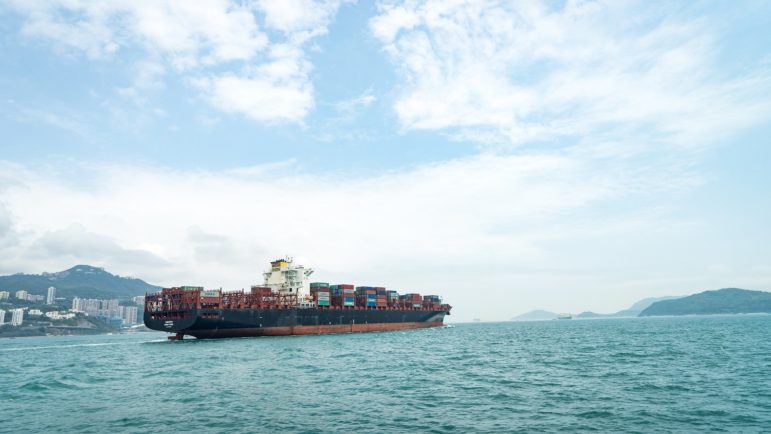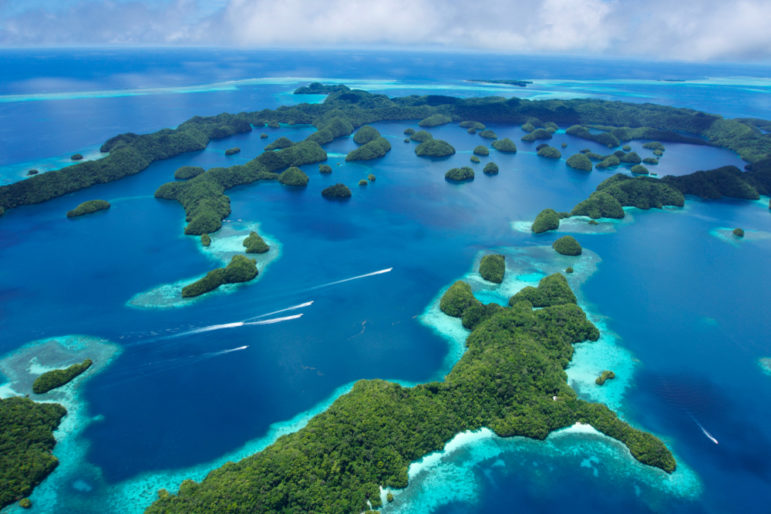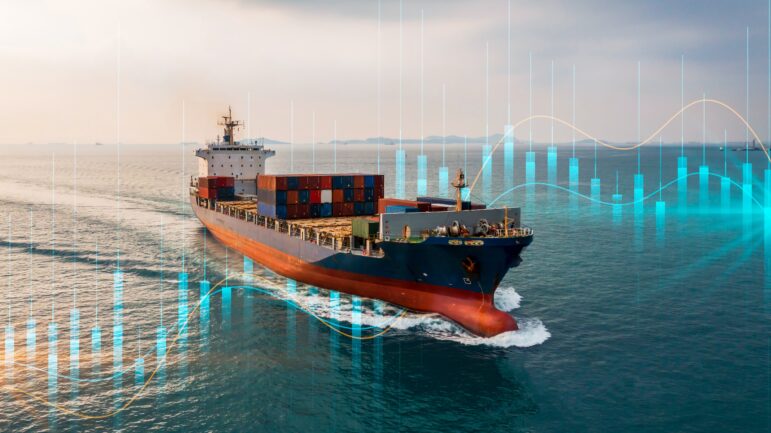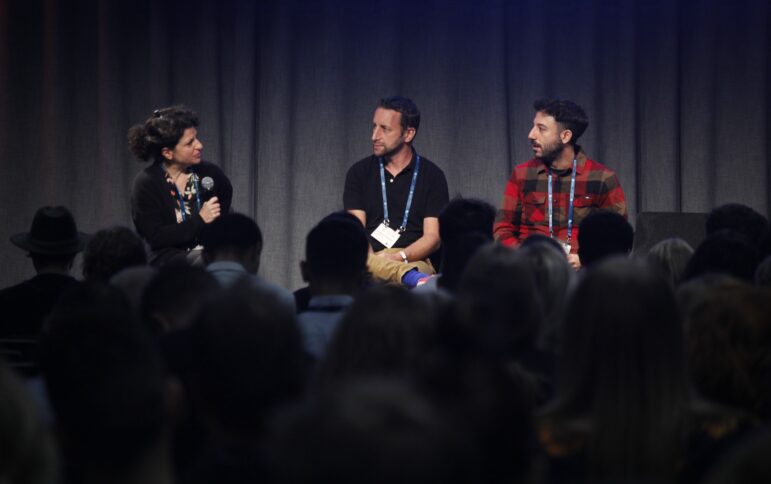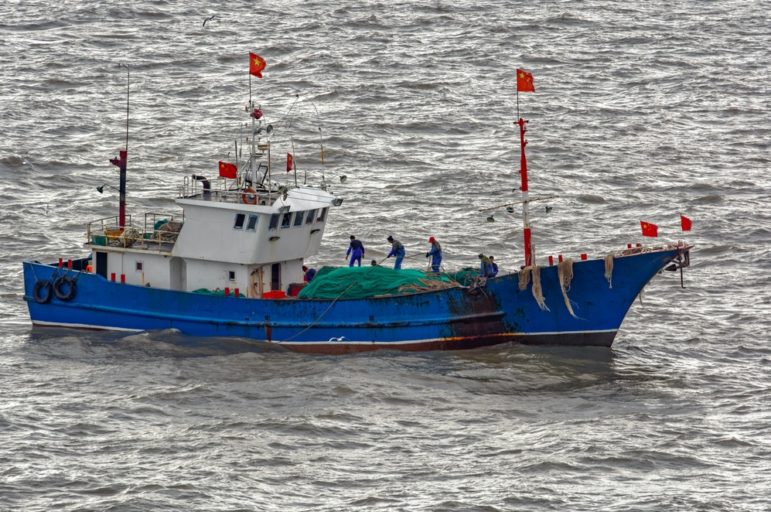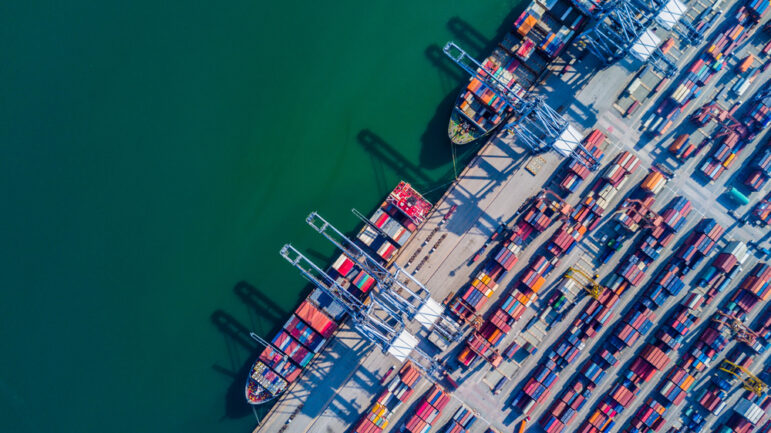

Thai naval officers conducting a raid on a fishing vessel suspected of illegal fishing. Image: Shutterstock
Toolkit: How to Investigate Illegal, Unreported, and Unregulated (IUU) Fishing
Read this article in
Editor’s Note: This toolkit was originally published by the Pulitzer Center and is republished here with permission.
It is estimated that one in five fish caught comes from illegal, unreported, and unregulated (IUU) fishing practices. The issue, which accounts for 20% of the global seafood catch, annually costs the economy US$23 billion.
The problem does not only have a financial impact. Marine ecosystems, coastal communities, food security, and human rights are on the line. And IUU fishing is hard to combat because jurisdiction in the ocean is a complex issue.
International treaties state that each country’s national jurisdiction extends 200 nautical miles off their coast: an area called Exclusive Economic Zone (EEZ). Beyond their EEZ, countries have no authority to apply their laws or regulations.
Still, many initiatives try to mitigate IUU fishing such as a UN agreement that aims to conserve and incentivize sustainable use of Marine Biodiversity of Areas Beyond National Jurisdiction (also known as the BBNJ or high seas treaty) and the Global Dialogue on Seafood Traceability (GDST).
To support journalists covering IUU fishing and its consequences, the Ocean Reporting Network (ORN) has created this toolkit and hosted a webinar on Tuesday, June 11, 2024.
What is IUU Fishing?
Many activities fall under the umbrella of IUU fishing, here are some examples:
- Fishing in an EEZ or in a regional fisheries management organization (RFMO) area without a license;
- Fishing above quota (or non-permitted species);
- Fishing out of season or with illegal gear;
- Not reporting or misreporting catches;
- Transferring fish without authorization;
- Failure to broadcast vessel location.
The list can go on, but it’s important to keep in mind that any fishing activity that violates regional, national, or international legislation or undermines fisheries management authorities can be considered IUU fishing. Journalists must also note that legal fishing has the potential to collapse fisheries and threaten species, especially when local legislation sets quotas too high or when there is not a transparent dialogue between coastal communities and policy markers.
Why Is Ocean Governance and Transparency Important?
To tackle IUU fishing, various monitoring, control, and surveillance efforts are underway. The International Maritime Organization (IMO), responsible for safe international shipping, requires ships of a certain size to carry an Automatic Identification System (AIS) device.
The AIS indicates the ship’s course, position, speed, and other relevant information. The device should be on and broadcasting at all times, regardless of location, fishing activity or flag, unless there is a valid reason like the threat of an attack to turn it off. However, it is common for vessels to break this rule and turn off their device to hide the fact that they are fishing where they should not.
Using tools such as Global Fishing Watch and MarineTraffic, it can be possible to study ships’ movements to detect transshipment, fishing methods, and ports of call.
Governments often fail to monitor and control their fish stocks efficiently because they lack the resources and information to do so. A good tip for journalists is to investigate the regulatory body responsible for fisheries in their countries. Who is responsible for the ministry? What laws or regulations are they proposing and passing? How transparent are they with the data offered to citizens?
Investigative Opportunities
One major lead journalists can pursue concerns whether a vessel is in compliance with fishing regulation. There are many storylines to explore:
- What is the context of IUU fishing in the country you are interested in?
- With the IUU Fishing Risk Index, you can explore different countries and see how they are exposed to and effectively combat IUU fishing. Here’s an example for Brazil.
- Has the ship you’re interested in been blacklisted?
- The EU has a list of ships that have done IUU fishing and are blacklisted. TMT also compiles their own. And in case you’re just interested in learning more about a ship, FleetMon compiles a list of ships from all over the world.
- Investigate who owns the quotas of which species.
- ORN Fellow Regin Winther Poulsen, for Follow the Money, discovered that British fishing communities are struggling because big companies — many of them international conglomerates — have bought quotas for the country’s most valuable species, controlling the price of the fish from sea to plate.
- What are the species of a particular area and what is their quota?
- For example, if you are looking into the shark fin trade, you should know that the shark fin Harmonized System (HS) code is 030571. With this code, you can enter the UN Comtrade portal, see the general trade information on shark fins and check how that compares to a certain national quota.
- ORN Fellow Magali Estrada, for Ojo Publico, reported on how the Comptroller General of the Republic detected that, between January 2020 and July 2023, seven officials from the Ministry of Production (PRODUCE) irregularly issued 35 permits for the export, from Peru, of more than 24,000 kilos of shark fins, valued at US$883,325.51.
- Are there indications of transshipment?
- Transshipment occurs when catch is transferred from a fishing vessel to a “carrier vessel.” It occurs for many reasons, sometimes to save time until the fish reach the market, but other times it happens to cover IUU fishing. With Global Fishing Watch, you can filter the map for “encounters” and see if a vessel you are interested in “met” another vessel at sea.
- What other legal frameworks are enabling IUU fishing?
- Some fishing vessels register in other countries whose jurisdictions are more lax with respect to regulations like quotas and bycatch. Companies may also register using complex corporate structures to hide the identity of beneficial owners. Understanding how to map these structures can be key to discovering IUU fishing.
Experts on IUU Fishing
From legal frameworks, to data collection and analysis, academics and consultants have assessed regional levels of IUU fishing and estimated global losses. In this section, we highlight some of the leading scholars dedicated to IUU fishing, separated by region and based on publications that have inspired our own research.
Asia
- Aris Widagdo / Indonesia / ariswidagdo_stp@yahoo.com
Africa
- Alkaly Doumbouya / Guinea / adoumbouyah@gmail.com
Americas
- Gohar A. Petrossian / US / gpetrossian@jjay.cuny.edu
- University of Washington Sustainable Fisheries team / USA / https://sustainablefisheries-uw.org/
- Rashid Sumaila / Canada / r.sumaila@oceans.ubc.ca
- Ganapathiraju Pramod / Canada / prammod.raju@gmail.com
Antarctica
- Frederick P. Hemans / USA / fhemans@ucsd.edu
Europe
- Enric Sala / Spain / jeli@ngs.org
- Gilles Hosch / UK / gilles.hosch@diatomconsulting.com
- Daniel Pauly / France / d.pauly@oceans.ubc.ca
Oceania
- Reniel Cabral / Australia / reniel.cabral@jcu.edu.au
Reporting Resources
There are platforms and technologies that provide journalists with tools to uncover, document, and report on IUU fishing activities, contributing to greater transparency and accountability in global fisheries management.
Tracking vessels
- MarineTraffic – Displays near real-time positions of vessels and relevant information.
- Ship Spotting – A platform useful for getting photos of vessels.
- Global Fishing Watch (GFW), especially Carrier Vessel Portal – Tracks ship movement.
- World Shipping Register – Provides data about ships and shipping companies.
- EU Fleet Register – Details of EU fishing fleets.
Tracking containers
- Track Trace – Tracks containers, shippers, and postal parcels.
Identifying vessels
- Equasis – A free account allows you to see which company owns a boat.
- Once you find which company is behind the vessel, you can use this guide to find out who owns the company.
- Combined IUU Vessel list – Up-to-date information on all fishing and related vessels that appear on the IUU fishing vessel lists.
- Marine Stewardship Council – Provides information on certified fisheries. If a company or vessel that you are investigating does not appear on their database, that can raise concerns
- Triton by C4ADS – An interactive platform to explore the connections between industrial fishing vessels at sea and the companies that control them.
Conservation and protection
-
- SeaAroundUs – The platform has data on marine protected areas, mariculture, and fisheries economics.
- Oceana – A wide range of resources and interactive maps.
- Fish-I Africa – Intergovernmental initiative to track fishing in East Africa.
- Planet Tracker – Has a seafood database and an IUU fishing detection toolkit
- Accountability.Fish – Initiative to promote transparency in the international fisheries management system, particularly in Regional Fisheries Management Organizations (RFMOs).
- TMT – A consulting firm that provides fisheries intelligence, analysis and capacity building. They also manage a list of IUU vessels published by RFMOs worldwide.
- Pew Ending IUU Project – Useful explainers and guides on tackling illegal fishing through various measures, particularly technology.
- Stimson Center for Maritime Security – US think tank very active in supply chain transparency and governance.
 Fernanda Buffa (Fernanda Seavon) is a Brazilian journalist based in Bologna, Italy. She has an Erasmus Master’s degree in Journalism, Media, and Globalization and has collaborated with Al Jazeera, WIRED, The Intercept Brasil, Coda Story, VICE, and others. Before joining the Pulitzer Center as an Assistant at the Rainforest Journalism Fund, Fernanda also worked in communication at a UN Counter-Terrorism unit.
Fernanda Buffa (Fernanda Seavon) is a Brazilian journalist based in Bologna, Italy. She has an Erasmus Master’s degree in Journalism, Media, and Globalization and has collaborated with Al Jazeera, WIRED, The Intercept Brasil, Coda Story, VICE, and others. Before joining the Pulitzer Center as an Assistant at the Rainforest Journalism Fund, Fernanda also worked in communication at a UN Counter-Terrorism unit.
 Alexandra Waddell is a graduate of the Croft Institute for International Studies at the University of Mississippi. She joined the Pulitzer Center team in 2021 as a copy editor assistant.
Alexandra Waddell is a graduate of the Croft Institute for International Studies at the University of Mississippi. She joined the Pulitzer Center team in 2021 as a copy editor assistant.

